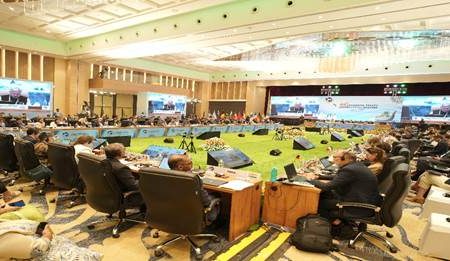Kochi: In a historic move, India is set to play a crucial role in facilitating the first-ever focused discussions on regulating tourism in Antarctica at the 46th Antarctic Treaty Consultative Meeting (ATCM) and the 26th Meeting of the Committee for Environmental Protection (CEP). The event, hosted in Kochi, Kerala, from May 20 to May 30, was inaugurated today by Union Minister Kiren Rijiju from the Ministry of Earth Sciences (MoES). The National Centre for Polar and Ocean Research (NCPOR), Goa, under MoES, along with the Antarctic Treaty Secretariat, is organizing these meetings.
The gathering has attracted over 350 participants from nearly 40 nations. These high-level global annual meetings are conducted in accordance with the provisions of the Antarctic Treaty, a multilateral agreement signed in 1959 by 56 Contracting Parties. Member countries discuss issues related to the science, policy, governance, management, preservation, and protection of Antarctica.
India, a Consultative Party to the Antarctic Treaty since 1983, plays a vital role in the governance of Antarctic scientific exploration and environmental protection. Along with 28 other Consultative Parties, India has the right to propose and vote on decisions and resolutions concerning administration, scientific research, environmental protection, and logistical cooperation.
Dr. M. Ravichandran, Secretary of MoES and Head of the Indian delegation, emphasized the significance of the initiative, stating, “Antarctica represents one of the last frontiers of wilderness and scientific discovery. As stewards of this extraordinary region, it is our collective responsibility to ensure that all activities, including research and tourism, are conducted in a manner that preserves its ecological integrity for future generations. India is honored to lead this crucial initiative at the 46th ATCM, which is expected to bring a series of actionable recommendations to be incorporated into the broader framework of the Antarctic Treaty System.”
India’s commitment to regulating tourism in Antarctica is driven by the increasing number of tourists visiting the continent, which has become a pressing issue due to potential environmental impacts. The 46th ATCM marks the first time a dedicated working group has been formulated to address this challenge, reflecting India’s proactive approach.
Dr. Thamban Meloth, Director of NCPOR, highlighted the legal framework established by India to regulate activities in Antarctica, including tourism, through the Indian Antarctic Act enacted in 2022. “The Indian Antarctic Act aligns India’s tourism regulations with international standards and collaborates with other Antarctic Treaty nations to achieve common conservation goals,” he said.
India has a strong history of involvement in Antarctic research and international cooperation. The country hosted the 10th SCAR (Scientific Committee on Antarctic Research) conference in 2022, themed ‘Antarctica in a Changing World,’ and has conducted multiple expeditions to the Southern Ocean, Wedell Sea, and South Pole. India’s previous hosting of the 30th ATCM in New Delhi in 2007 underscores its ongoing commitment to the Antarctic Treaty System.
During the plenary session of the 46th ATCM, an invited talk was given by Padma Bhushan Dr. Shailesh Nayak, former Secretary of MoES, on ‘Antarctica and Climate Change.’ Ambassador Pankaj Saran, elected Chairperson of the 46th ATCM and 26th CEP, remarked on India’s significant role in shaping the future of Antarctic governance, stating, “The collaborative efforts of nations within the Antarctic Treaty System are crucial in preserving the pristine environment and advancing scientific research in Antarctica. Through its leadership and commitment, India continues to play a key role in shaping the future of Antarctic governance.”

